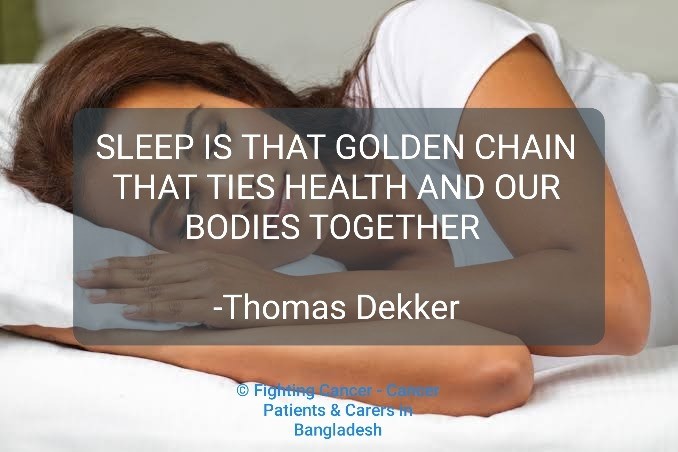
What's better than waking up feeling refreshed in the morning after a really good night's sleep? We do crave to sleep more; however, most of us are walking around depriving this essential element of our body. Sleep deprivation has become a badge of honour in our society. We all know at least one person who says, "I'll sleep when I'm dead or brags "I get lots of time to finish my work because I sleep less ".These people don't realize that lack of sleep is making them less productive and affecting their immune system. According to the National Sleep Foundation, an average adult needs seven to nine hours of sleep each night. When we don't get enough sleep, our immunity and brain function reduces. The National Sleep Foundation also states that our genes begin to change when we sleep less than six hours a night. In biological terms, change in genes means mutation. When mutations occur in genes, cells may begin to divide out of control. Cancer is an overgrowth of cells that should otherwise have been regulated or repaired before they got out of control. Our sleep cycle is regulated by two body systems: sleep/wake homeostasis and the circadian biological clock. Our internal circadian biological clock controls the periods of sleepiness and wakefulness throughout the day.
On the other hand, biological clocks are an organism's innate timing device. When we fail to sleep properly our biological clock either starts to run fast or slow, which results in disrupted circadian rhythms leading to various chronic health conditions. So many things are going on inside our body while we are asleep. It's a time when our body most efficiently repairs DNA damage, regulates the growth of cells, turns on certain genes and switches off others. Researchers suspect that a disturbance in the circadian rhythm could pose a risk for developing cancer, as the body's internal clock affects so many biological functions. A study in the International Journal of Cancer found a connection between women's irregular work schedules and the rate of breast cancer. They found that the rate of breast cancer was 30 per cent higher for the women who had worked shifts. Even men are at higher risk of having cancer such as prostate cancer, lung cancer or colorectal cancer. Adequate sleep is important to health for a range of reasons, not just cancer risk, therefore, getting in sync with our body's natural sleep-wake cycle, or circadian rhythm is necessary.
Here are some essential tips about how we can have a good night sleep:
• Try to sleep and get up at the same time every day – Having a regular sleep-wake schedule, will make us feel much more refreshed and energized.
• Exposing ourselves to bright sunlight in the morning - Daily sunlight can improve sleep quality, especially if we have severe sleep issues or insomnia.
• Exercise during the day – We can do a deep breathing exercise. It activates the relaxation response and lowers our heart rate, blood pressure, and stress levels to help us drift off to sleep.
• Look after our eating and drinking habit – Limit caffeine and nicotine intake.
• Avoid eating heavy meals at night and also cut back on sugary foods and refined carbs. It can result in poor sleep and hormone disruption.

